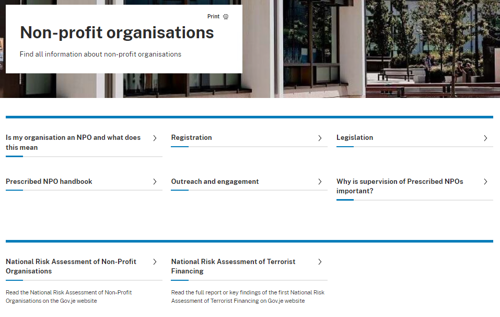
The JFSC update its website to help with the “Prescribed NPO” Order & Codes
10/01/2023
The Prescribed NPO Order came into force on 1 January 2023.
If your NPO falls within the definition of a Prescribed NPO it will be required to meet certain additional requirements. The additional requirements are detailed within the Non-Profit Organisations Order, and formalise measures that may already be in place as part of your NPO’s good governance.
A brief outline of the requirements as stated in the Non-Profit Organizations (Jersey) Order 2008 can be seen below:
- Article 2 -To prepare an annual financial statement
- Article 3 -To have appropriate accounting systems and controls in place
- Article 4 -To keep records of owners, controllers etc. sufficient to identify them
- Article 5 -To keep a record of significant donors
- Article 6 -Take reasonable steps to identify other NPOs with whom your NPO may be working, the beneficiaries, activities, and the nature of the relationship
The following links will direct you to the Jersey Legal Information Board website, where Jersey laws are published.
- Non-Profit Organizations (Jersey) Law 2008 = https://www.jerseylaw.je/laws/current/Pages/15.430.aspx
- Non-Profit Organizations (Jersey) Order 2008 = https://www.jerseylaw.je/laws/enacted/Pages/RO-110-2022.aspx
NPOs only need to register if they meet the following definition:
- A legal person or arrangement or organisation that primarily engages in RAISING OR DISBURSING* funds for purposes such as
- Charitable, Religious, Cultural, Educational, Social or
- Fraternal Purposes, [https://www.collinsdictionary.com/us/dictionary/english/fraternal-society] or
- For the carrying out of other types of good works?
- Definitions on the above[*]
- *Raising –
- Funds given to the NPO but does not include income earned on the funds of the NPO or amounts paid to the NPO by persons to become or remain members of the NPO
- *Disbursing –
- Does not include the disbursement of funds paid to the NPO by persons to become or remain members of the NPO if those funds are applied in a way that only benefits members of the NPO.
- A disbursement also does not include a payment for goods and services. A payment is when you send funds for a specific agreed value for goods or services, where a disbursement is a transfer of money to a beneficiary to fulfil the objects of the organisation”.
Although only a very limited number of NPOs will be considered ‘prescribed” the JFSC have updated
- Its website and AML/CFT/CPF Handbook to assist the NPO sector with these changes [see screen shot below]
- https://www.jerseyfsc.org/industry/sectors/non-profit-organisations/
- Its AML handbook (with a new Section 17), which sets out guidance and Codes of Practice to support prescribed NPOs.
- Handbook-section-17.pdf (jerseyfsc.org)
- https://www.jerseyfsc.org/media/6229/handbook-section-17.pdf
The above [no1] non-profit organisations page [image below] has been updated with new information and guidance for NPOs, including what defines a Prescribed NPO.

The Team
Meet the team of industry experts behind Comsure
Find out moreLatest News
Keep up to date with the very latest news from Comsure
Find out moreGallery
View our latest imagery from our news and work
Find out moreContact
Think we can help you and your business? Chat to us today
Get In TouchNews Disclaimer
As well as owning and publishing Comsure's copyrighted works, Comsure wishes to use the copyright-protected works of others. To do so, Comsure is applying for exemptions in the UK copyright law. There are certain very specific situations where Comsure is permitted to do so without seeking permission from the owner. These exemptions are in the copyright sections of the Copyright, Designs and Patents Act 1988 (as amended)[www.gov.UK/government/publications/copyright-acts-and-related-laws]. Many situations allow for Comsure to apply for exemptions. These include 1] Non-commercial research and private study, 2] Criticism, review and reporting of current events, 3] the copying of works in any medium as long as the use is to illustrate a point. 4] no posting is for commercial purposes [payment]. (for a full list of exemptions, please read here www.gov.uk/guidance/exceptions-to-copyright]. Concerning the exceptions, Comsure will acknowledge the work of the source author by providing a link to the source material. Comsure claims no ownership of non-Comsure content. The non-Comsure articles posted on the Comsure website are deemed important, relevant, and newsworthy to a Comsure audience (e.g. regulated financial services and professional firms [DNFSBs]). Comsure does not wish to take any credit for the publication, and the publication can be read in full in its original form if you click the articles link that always accompanies the news item. Also, Comsure does not seek any payment for highlighting these important articles. If you want any article removed, Comsure will automatically do so on a reasonable request if you email info@comsuregroup.com.


